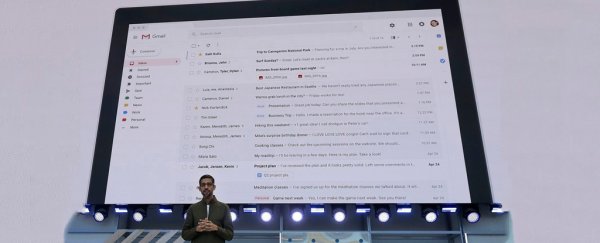It's difficult to remember a time when Google did not oversee, organize and mine every aspect of our existence, but in 2004, its new email service seemed so powerful that it couldn't be real.
Gmail's announced features were mind-bending: a gigabyte's worth of storage that blew away other services by 100 times. And it would be searchable! Like Google!
That capacity does not seem like a whole lot now. But in 2004, Hotmail and Yahoo offered a comparatively minuscule two or four megabytes of email storage - barely enough to hold Myspace password reset links and flat-earth conspiracy theory forwards from your uncle.
Storage equivalent to 50,000 emails, then, sounded a bit far-fetched.
But there were a couple of other hitches, too. Google announced the limited test run of Gmail on April 1, 2004.
And the news release was, in the parlance of our 2019 times, on brand for Google's cute and informal culture. "Heck, yeah" makes an appearance. There is mention of M&Ms.
Then there is the folksy origin story of one user's complaint about existing email platforms that led to the genesis of the world's dominant email platform.
"She kvetched about spending all her time filing messages or trying to find them," said co-founder Larry Page. "And when she's not doing that, she has to delete email like crazy to stay under the obligatory four megabyte limit. So she asked, 'Can't you people fix this?' "
It got a lot of people asking: Is this a joke?
The Washington Post's Mike Musgrove wondered that at the time, and he spoke to experts who weighed the curious date of launch against what made Google unique in a sea of other search engines.
"Yahoo lost its lead in search by becoming a portal," Nate Elliott, an Internet advertising analyst at Jupiter Research at the time, told The Post. "So much of [Google's] reputation is built on [having] a clean, white site with no distractions."
Elliott added: "I'm still not convinced it's not a joke."
Musgrove noted there were other clear jokes that same day, such as the news that Google would open an office on the moon.
CNN reported that day that the initiative was a little bit of both of what many suspected - a real service, cheekily timed.
If Gmail was forward-looking to an increasingly connected world, so were concerns over tech companies lording over private data and selling it to companies in exchange for a so-called free service.
On launch, Gmail described its advertising platform as akin to coupons at the grocery store that print out based on your purpose. That sounds innocuous, but Google gains that insight by flagging keywords in messages and presenting that data to third parties, raising questions over where the data is housed, who has access and how secure it can be as storage capabilities soar.
"It's a back door to seeing the content of your email, without seeing your email," Kevin Bankston, then an attorney focused on consumer rights, told Musgrove.
Now Congress is racing to rein in tech companies for their roles in spreading misinformation, fueling deadly violence and routinely mishandling the private data of millions.
The capabilities that produced Google, and Gmail by extension, led to those serious issues.
In 2004, only months after Mark Zuckerberg debuted a website called the Facebook, that other behemoth celebrated the hard work that pioneered how Silicon Valley vacuums up personal data.
"Millions of M&Ms later, Gmail was born," Google wrote in its news release.
2019 © The Washington Post
This article was originally published by The Washington Post.
